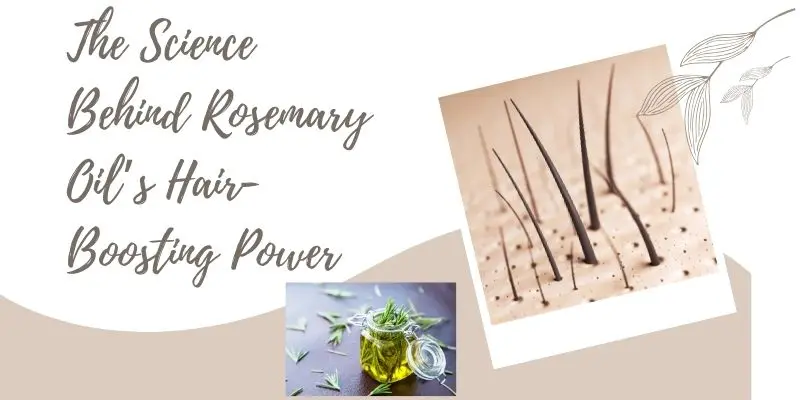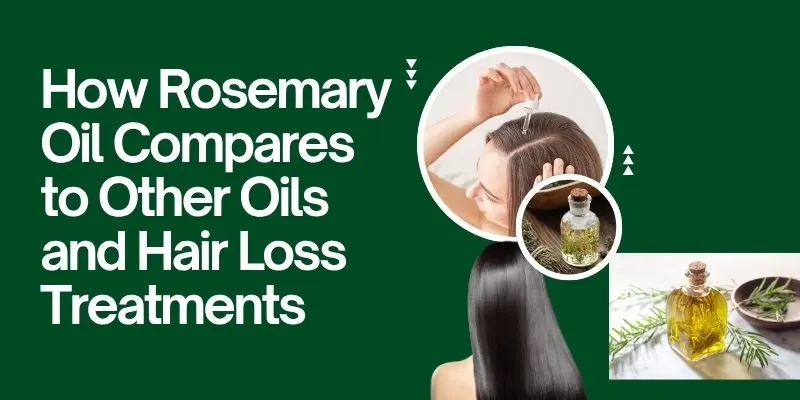Add Rosemary Oil: The Natural Secret to Thicker, Healthier Hair Backed by Science
Published: 27 Jun 2025
Looking for a natural way to add rosemary oil to your hair care routine? You’re not alone. Thousands are turning to this herbal remedy to combat hair thinning, dryness, and breakage. Rosemary oil for hair growth isn’t just hype; it’s supported by real research. From scalp stimulation to boosting shine, this essential oil offers more than meets the eye. In this guide, we’ll uncover how and why you should use rosemary oil the right way. Whether you’re battling hair loss or want stronger strands, this is your go-to solution. Curious about the results? Keep reading, you’re just one step away from transforming your hair.
Why Everyone’s Talking About Rosemary Oil for Hair
Rosemary oil is gaining buzz for its powerful ability to boost hair growth, reduce shedding, and improve scalp health naturally. Its blend of anti-inflammatory and circulation-boosting properties makes it a favorite among beauty enthusiasts and haircare experts alike.
The Rise of a Timeless Herbal Remedy
In an era where people are increasingly ditching chemicals for natural hair care solutions, rosemary oil has emerged as a standout favorite. Once a well-kept herbal secret, it’s now dominating hair forums, beauty blogs, and dermatologist discussions, and is frequently featured in every trusted hair care guide for its proven benefits.
This age-old remedy is not just folklore. Modern science is beginning to catch up with what ancient civilizations already knew: Rosemary oil holds real potential for improving scalp health and encouraging natural hair growth. With concerns like hair thinning, breakage, and dullness on the rise, many are seeking safer, plant-based alternatives, and rosemary oil is a suitable option.
From Tradition to Trending: Why Now?
So, what’s causing this recent explosion in popularity?
- Clinical studies show that rosemary oil can be as effective as minoxidil (a pharmaceutical hair growth solution), but without harsh side effects.
- Social media influencers and beauty experts are showcasing dramatic before-and-after results from consistent use.
- The demand for non-toxic, organic beauty products has skyrocketed in the post-pandemic wellness movement.
- Unlike many overhyped products, rosemary oil delivers both short-term benefits (like added shine and reduced itchiness) and long-term results (like thicker, fuller hair). It’s become a hero ingredient in countless shampoos, serums, and DIY treatments.
A Natural Answer to Modern Hair Problems
Hair loss and scalp irritation are no longer limited to the aging population; they’re increasingly affecting young adults due to stress, pollution, and poor lifestyle habits. That’s why rosemary oil is becoming a go-to solution for people of all ages.
Its anti-inflammatory, antioxidant, and antimicrobial properties make it ideal for treating:
- Dandruff and dry scalp
- Weak hair roots
- Slow hair growth
- Oily or congested scalp pores
By naturally improving blood circulation to the scalp, it supports stronger, healthier hair follicles from the root up.
What Exactly Is Rosemary Oil, and How Is It Made?
Rosemary oil is a natural oil made from the leaves of the rosemary plant. It smells fresh and earthy, and many people use it for hair and skin care. To make it, the leaves are usually steamed or soaked in oil to pull out their healthy parts.

This process helps keep the vitamins and scent in the oil. Rosemary oil is full of antioxidants that can boost scalp health and improve blood flow. Many people love it for helping with hair growth and shine, making it a popular choice in hair growth tips shared by experts and enthusiasts alike.
A Healing Gift from the Rosemary Plant
Rosemary oil is a highly concentrated essential oil derived from the leaves and flowering tops of the rosemary plant (Rosmarinus officinalis), a woody, evergreen herb native to the Mediterranean. Though widely known for its culinary and aromatic uses, rosemary has a long history in natural medicine and hair care traditions, particularly as a remedy for thinning, itchy, or inflamed scalps.
The oil is rich in bioactive compounds such as rosmarinic acid, cineole, and camphor, all of which contribute to its anti-inflammatory, antimicrobial, and circulation-boosting effects. These properties make it especially useful for hair follicle stimulation, promoting stronger, thicker strands over time.
Essential Oil Extraction: How Pure Rosemary Oil Is Made
The most common and trusted method for creating pure rosemary oil is through steam distillation. In this process:
- Fresh rosemary leaves and flowers are placed into a chamber.
- Steam is passed through the plant material, allowing volatile compounds to be released.
- The steam and oils are then condensed and separated.
- The result is a potent, therapeutic-grade essential oil and a fragrant water byproduct known as rosemary hydrosol.
Steam distillation preserves the oil’s integrity and makes it suitable for topical use in natural hair care routines. Other methods like solvent extraction or cold pressing exist, but they’re less common for rosemary and may result in diluted or contaminated oils.
Choosing the Right Rosemary Oil for Your Hair
Not all rosemary oils are created equal. When shopping for hair-safe oil, look for labels that read:
- 100% pure rosemary essential oil
- Steam distilled
- Organic or wildcrafted
- Therapeutic-grade
Avoid oils with additives, artificial fragrances, or carrier oils unless they’re clearly stated (like rosemary oil diluted in jojoba or coconut). For maximum scalp benefits and hair growth results, the oil should be undiluted and clean.
The Science Behind Rosemary Oil’s Hair-Boosting Power
Rosemary oil helps your hair by waking up the hair roots and improving blood flow to the scalp. This means more nutrients reach your hair, helping it grow stronger and healthier. It also has natural anti-inflammatory and anti-bacterial powers, which keep your scalp clean and balanced.

Some studies even show that rosemary oil may work as well as hair growth treatments. With regular use, it can reduce hair fall and make your hair look fuller. That’s why many people trust rosemary oil to boost their hair’s health naturally.
Nature Meets Research: How Rosemary Oil Supports Hair Growth
While rosemary oil has long been cherished in traditional remedies, it’s now gaining scientific recognition for its powerful impact on hair health. But what exactly makes this essential oil so effective? The answer lies in how it interacts with the scalp, hair follicles, and underlying biological processes.
Improved Scalp Circulation = Healthier Follicles
One of the main reasons rosemary oil is praised for promoting natural hair growth is its ability to stimulate blood circulation to the scalp. When applied topically, it encourages increased blood flow around the hair follicles, delivering more oxygen and nutrients to the root. This supports the anagen phase (growth phase) of the hair cycle, helping your strands grow stronger and last longer before shedding.
Research published in Skinmed (2015) compared rosemary oil to minoxidil, a popular hair regrowth drug. After six months of consistent application, both groups showed significant hair growth, proving that rosemary oil’s natural stimulation works similarly, but with fewer side effects like itching or dryness.
Anti-Inflammatory and Antioxidant Effects
Inflammation is a hidden culprit behind hair loss, especially in conditions like alopecia areata, dandruff, or scalp psoriasis. Rosemary oil contains carnosic acid, a potent antioxidant that helps heal tissue and reduce inflammation in the scalp.
These anti-inflammatory properties calm irritated skin, balance oil production, and prevent clogged follicles, creating the perfect environment for healthy hair growth. The antioxidants in rosemary oil also neutralize free radicals, which can damage hair cells and speed up aging.
DHT Blocker: A Natural Defense Against Hair Thinning
Another exciting area of research is rosemary oil’s potential to block Dihydrotestosterone (DHT), a hormone linked to androgenetic alopecia, the most common form of hair loss in men and women. DHT shrinks hair follicles over time, leading to thinning and receding hairlines.
Some studies suggest that rosemary oil can reduce DHT’s effects on the scalp, preserving hair density and preventing follicle miniaturization. While more clinical research is needed, early findings and anecdotal reports are promising.
What This Means for You
In short, rosemary oil doesn’t just “smell nice.” It acts on multiple levels to boost your hair health:
- Stimulates circulation for stronger roots
- Reduces inflammation to soothe the scalp
- Fights oxidative stress to protect hair structure
- Blocks DHT to prevent hormonal hair loss
By incorporating rosemary oil into your routine, you’re harnessing the power of both nature and science
Supporting your hair’s health from the inside out.
Surprising Benefits of Rosemary Oil for Your Hair
Rosemary oil can make your hair grow faster and fall out less. It also helps with dry scalp and adds shine. With regular use, your hair may look thicker and healthier.
More Than Just Hair Growth
Most people know that rosemary oil helps with hair growth, but that’s not all it does. This natural oil has many hidden benefits for your scalp and strands. Whether you struggle with dryness, dandruff, or dull hair, rosemary oil can be a powerful helper in your hair care routine.
Let’s break down what makes it so special.
1. Helps Reduce Hair Fall
Rosemary oil can make your hair roots stronger, which means less breakage and shedding. Boosting blood flow to the scalp gives your hair the nutrients it needs to grow and stay in place.
2. Fights Dandruff and Itchy Scalp
Thanks to its antibacterial and antifungal powers, rosemary oil helps fight off scalp infections, flakes, and itchiness. If you have dandruff, it can calm your skin and stop the constant scratching.
3. Adds Shine and Softness
Rosemary oil smooths the hair cuticle (the outer layer of your hair), which helps add natural shine and softness. It can also make dry, rough strands feel more silky and manageable.
4. Balances Oil Production
If your scalp gets oily fast, rosemary oil can help control extra oil without drying out your skin. It balances your scalp’s natural oils, keeping it clean and healthy.
5. Protects Against Hair Damage
Rosemary oil is full of antioxidants, which help fight off things that damage your hair, like pollution, sun, or harsh products. It protects your hair from breakage and keeps it looking fresh and strong.
6. Helps with Premature Graying
Some people say that regular use of rosemary oil helps slow down early graying, though more research is needed. Still, its natural healing power makes it a great option to keep hair youthful.
In Short: Why It’s Worth Trying
Using rosemary oil doesn’t just help your hair grow; it helps your whole scalp stay clean, calm, and healthy. It adds shine, reduces flakes, and makes your hair feel stronger and smoother.
Whether you’re fighting hair loss or just want to boost your hair’s natural beauty, rosemary oil can be your go-to natural remedy.
Who Should Use Rosemary Oil-and Who Shouldn’t
Rosemary oil is great for people with thinning hair or dry scalp. But if you’re pregnant, have sensitive skin, or scalp allergies, talk to a doctor first. Always do a patch test before using it.
Is Rosemary Oil Right for You?
Rosemary oil is a powerful and natural choice for many hair problems, but it’s not for everyone. While it can help with hair growth, dandruff, and scalp health, there are a few things you should know before adding it to your routine.
Let’s look at who should use it and who might want to be careful.
People Who Can Benefit from Rosemary Oil
People who can benefit from rosemary oil include those dealing with hair thinning, slow hair growth, or a dry scalp.
It’s also helpful for people wanting stronger, shinier, and healthier hair naturally.
1. People with Hair Thinning or Hair Loss
If your hair is falling out or getting thin, rosemary oil may help. It can wake up weak hair roots and improve blood flow to your scalp, which helps hair grow stronger and thicker.
2. Those with Dandruff or Dry Scalp
Rosemary oil has natural ingredients that fight germs and calm the skin. If your scalp feels itchy or flaky, it can help reduce dandruff and soothe irritation.
3. People with Oily Hair and Scalp
Rosemary oil helps balance oil production. If your scalp gets greasy too fast, using a small amount can help control oil without drying out your hair.
4. Anyone Wanting Healthier, Shinier Hair
Even if you don’t have hair problems, rosemary oil can still make your hair look and feel better. It adds a natural shine and keeps your scalp in good shape.
Who Should Be Careful or Avoid It
People with sensitive skin, scalp allergies, or certain medical conditions should use rosemary oil with caution.
1. People with Sensitive Skin or Allergies
Some people may have a reaction to essential oils, especially if they have sensitive skin. Always do a patch test first. Apply a tiny bit of diluted rosemary oil to your arm and wait 24 hours to see if there’s redness or itching.
2. Pregnant or Breastfeeding Women
Although rosemary oil is natural, it’s best to check with a doctor before using it during pregnancy or while breastfeeding.
3. Children Under 5 Years Old
Essential oils are very strong. They are usually not recommended for young children, as their skin can be too sensitive.
4. People with Medical Conditions (like epilepsy or high blood pressure)
Rosemary oil has strong effects on the body. If you have a serious health condition, talk to a healthcare provider before using it, especially on your skin.
Easy Safety Tips:
- Always dilute rosemary oil with a carrier oil like coconut, jojoba, or olive oil.
- Don’t use it more than 2–3 times a week to avoid buildup or irritation.
- Never apply essential oils directly to your scalp without mixing.
How Rosemary Oil Compares to Other Oils and Hair Loss Treatments,
Rosemary oil is a natural choice for hair growth, like coconut and castor oil, but it stands out for boosting blood flow to the scalp. Unlike chemical treatments, it doesn’t have harsh side effects.

Some studies show it works as well as minoxidil (a common hair loss drug) but with fewer risks. It also helps reduce dandruff and itching. Rosemary oil is a gentle, affordable option for many hair types.
Is Rosemary Oil Better Than the Rest?
Many oils and treatments promise to help with hair growth, like castor oil, peppermint oil, or even medicines like minoxidil. But how does rosemary oil compare?
Let’s break it down in simple terms so you can decide what’s right for your hair.
Rosemary Oil vs. Castor Oil
There are lots of benefits of Castor oil for hair. It is thick and rich. It’s known for helping hair feel soft and moisturized. Many people use it to make their hair grow longer and stronger.
- Castor Oil Strengths: Very moisturizing, good for dry or brittle hair.
- Downside: Can feel heavy and greasy; harder to wash out.
Rosemary oil, on the other hand, is lighter and works best for stimulating hair growth from the scalp by improving blood flow.
- Rosemary Oil Strengths: Boosts scalp circulation, helps with dandruff and hair thinning.
- Downside: Needs to be mixed with a carrier oil (like coconut or jojoba) before use.
Which is better? Use castor oil if you want deep moisture, but choose rosemary oil if you want to help your hair grow from the roots.
Rosemary Oil vs. Peppermint Oil
both boost hair health but work differently.
Rosemary supports growth and scalp circulation, while peppermint offers a cooling, refreshing effect.
Peppermint oil also boosts blood flow to the scalp and gives a cool, tingling feeling. It can help wake up your hair follicles, too.
- Peppermint Oil Strengths: Refreshing, energizing, and helps improve growth.
- Downside: May feel too strong or tingly for sensitive skin.
Rosemary oil is gentler and has anti-inflammatory properties, which makes it better for people with scalp irritation or dandruff.
Which is better? If your scalp is sensitive, rosemary oil is the safer choice. If you like a cooling effect and have no skin issues, peppermint oil might also work well.
Rosemary Oil vs. Minoxidil (Hair Loss Medicine)
Minoxidil is a drug used in products like Rogaine. It’s made for people with pattern baldness and is approved by doctors for hair regrowth.
- Minoxidil Strengths: Proven to grow hair faster.
- Downside: Can cause dryness, itching, and must be used forever to keep the results.
Rosemary oil has been shown in some studies to work just as well as minoxidil for some people, but without harsh side effects.
Which is better? If you want a natural, chemical-free option, rosemary oil is great. But if your hair loss is serious or genetic, your doctor may still recommend minoxidil.
In Short: Choosing What’s Best for You
| Treatment | Great For | Watch Out For |
| Rosemary Oil | Scalp health, natural hair growth | Must dilute, takes time |
| Castor Oil | Dry, damaged hair | Very thick, hard to rinse |
| Peppermint Oil | Boosting circulation, refreshment | Can irritate sensitive skin |
| Minoxidil | Medical hair loss | Side effects, costly, ongoing use |
Step-by-Step Guide: How to Use Rosemary Oil on Hair
In this guide, we’ll walk you through 6 simple steps to use rosemary oil correctly for hair growth and strength. From choosing the right oil to massaging and rinsing techniques, each step is designed to help you get real results naturally. Let’s break it down, step by step.
Want to Use Rosemary Oil the Right Way?
Using rosemary oil can help your hair, but only if you apply it the right way. If you’ve never used it before, don’t worry! This simple guide will show you exactly how to add it to your hair routine.
Step 1: Choose the Right Rosemary Oil
Look for 100% pure rosemary essential oil. The bottle should say words like:
- Steam distilled
- Therapeutic grade
- Organic
Avoid products with artificial scents or mixed oils unless they clearly say what’s inside.
Step 2: Mix It With a Carrier Oil
Never use rosemary oil directly on your scalp. It’s very strong and can irritate. Always mix it with a carrier oil to make it safe and gentle.
Here are some good carrier oils to use:
- Coconut oil (great for dry hair)
- Jojoba oil (good for oily scalp)
- Olive oil (moisturizing and easy to find)
- Argan oil (light and good for frizz)
How to mix:
Add 3–5 drops of rosemary oil to 1 tablespoon of carrier oil. Stir it well.
Step 3: Apply to Your Scalp
- Part your hair into sections so you can see the scalp.
- Use your fingertips or a dropper to apply the oil mix.
- Gently massage your scalp for 3–5 minutes in small circles.
This massage boosts blood flow and helps the oil soak into the roots.
Step 4: Let It Sit
After applying and massaging:
- Leave the oil in your hair for at least 30 minutes.
- You can also leave it overnight (cover your hair with a shower cap or towel).
This gives the oil time to nourish your scalp and roots.
Step 5: Wash It Out
Use your regular shampoo to wash the oil out. You may need to shampoo twice to remove all the oil. Then, condition your hair like normal.
Step 6: Repeat 2–3 Times a Week
You don’t need to use it every day. 2 to 3 times a week is enough to see results without making your hair greasy or heavy.
Bonus Tips:
- Mix rosemary oil into your shampoo or conditioner (2–3 drops per use).
- Use it in DIY hair masks with ingredients like honey, aloe vera, or yogurt.
- Store the oil in a cool, dark place so it stays fresh.
8. Can You Leave Rosemary Oil in Your Hair Overnight?
Yes, you can leave rosemary oil in your hair overnight for deeper nourishment. Just be sure to dilute it with a carrier oil to avoid scalp irritation.
Wondering If It’s Safe to Sleep with Rosemary Oil in Your Hair?
Many people ask, “Can I leave rosemary oil in my hair overnight?” The short answer is yes but only if you use it the right way. Leaving it in while you sleep can give your scalp more time to absorb the oil and do its job. But there are a few things to keep in mind to keep your hair and skin safe.
Is It Safe to Leave Rosemary Oil Overnight?
Yes, it’s safe for most people if you:
- Dilute it properly (always mix with a carrier oil like coconut or jojoba oil)
- Don’t use too much
- Don’t have very sensitive skin or scalp problems
Important: Never apply rosemary essential oil directly to your scalp without mixing it first. It’s very strong and can irritate your skin.
Benefits of Leaving It In Overnight
When rosemary oil stays on your scalp for hours, it has more time to:
- Boost blood flow to your hair roots
- Fight dandruff and dry scalp
- Strengthen hair follicles
- Support healthy hair growth
Plus, overnight treatments save time in the morning!
How to Do an Overnight Rosemary Oil Treatment
Yes, you can leave rosemary oil in your hair overnight if it’s diluted with a carrier oil like coconut or jojoba. It gives the scalp more time to absorb the nutrients.
Here’s a safe and easy way to try it:
- Mix the oil
- Add 3–5 drops of rosemary oil to 1–2 tablespoons of a carrier oil.
- Add 3–5 drops of rosemary oil to 1–2 tablespoons of a carrier oil.
- Apply it to your scalp
- Use your fingertips to gently rub the oil into your scalp.
- Focus on the roots, not the ends.
- Use your fingertips to gently rub the oil into your scalp.
- Cover your hair
- Use a shower cap or wrap your hair in a soft towel to protect your pillow and keep the oil in place.
- Use a shower cap or wrap your hair in a soft towel to protect your pillow and keep the oil in place.
- Go to sleep
- Let the oil work while you rest.
- Let the oil work while you rest.
- Wash it out in the morning
- Use shampoo to clean your hair. You may need to shampoo twice.
- Use shampoo to clean your hair. You may need to shampoo twice.
When You Shouldn’t Leave It Overnight
Avoid overnight use if:
- You have very sensitive skin or allergies
- You feel burning, redness, or itching after applying
- You’ve never used rosemary oil before (try it for a short time first)
Pro Tip:
If you’re not sure about leaving it overnight, start by using it for 1–2 hours during the day. See how your scalp reacts before trying an overnight treatment.
9. How Often Should You Apply Rosemary Oil for Real Results?
To see real results, apply rosemary oil to your scalp 2 to 3 times a week. You can mix it with a carrier oil like coconut or olive oil before using. Gently massage it into your scalp and leave it on for at least 30 minutes, or even overnight.

With regular use, you may start noticing less hair fall and more growth in a few months. Be patient—it takes time to work.
How Much Is Too Much?
Using rosemary oil can help your hair grow, but like anything else, using it too much or too little can slow down your results. The key is to find the right balance and stick with it.
Let’s look at how often you should use it and what to expect.
How Often Should I Use Rosemary Oil?
For most people, 2 to 3 times a week is perfect.
This gives your scalp time to absorb the oil and helps your hair grow stronger without causing too much buildup or greasiness.
Best routine:
Apply rosemary oil every other day
Let it sit for 30 minutes to 1 hour, or even overnight if your skin is not sensitive
Wash it out with shampoo as usual
What If I Use It Every Day?
It’s not harmful to use rosemary oil daily if it’s diluted properly, but it may:
- Make your scalp oily
- Weigh down your hair
- Cause builds up over time
Instead of daily use, try using it every 2 days, which gives your scalp a break and keeps results steady.
How Long Before I See Results?
Like any natural remedy, rosemary oil takes time and patience. You may start to see results such as:
- Less hair fall after 2–3 weeks
- New baby hairs and stronger strands in 2–3 months
- Thicker, fuller hair after 3–6 months of regular use
Remember, consistency is more important than using a lot at once.
Tips to Stay Consistent
- Set a reminder on your phone
- Make it part of your wash day routine
- Mix it into your shampoo or conditioner if you’re short on time
- Keep your oil bottle in a visible place so you don’t forget
10. Best Rosemary Oil Products Recommended by Experts
Experts recommend using pure, organic rosemary essential oil or blends like Mielle Organics and The Ordinary. These trusted brands support hair growth and scalp health effectively.
Not Sure Which Rosemary Oil to Buy?
There are many rosemary oil products out there, but not all of them are good for your hair. Some are mixed with cheap ingredients or have fake fragrances. That’s why it’s important to pick a product that’s pure, safe, and approved by hair experts.
Here are some of the best rosemary oils you can use for hair growth and scalp health.
1. Mielle Rosemary Mint Scalp & Hair Strengthening Oil
Mielle Rosemary Mint Scalp & Hair Strengthening Oil is a popular choice for promoting hair growth and reducing breakage. It combines rosemary, mint, and biotin to nourish the scalp and strengthen strands.
Why it’s great:
This is one of the most popular oils for hair growth. It’s made with rosemary oil, mint, and biotin, which help grow and strengthen your hair. Many people love how it makes the scalp feel fresh and clean.
Good for: Weak, dry, or thinning hair
Bonus: It smells amazing and has no harsh chemicals.
2. Handcrafted Blends 100% Pure Rosemary Essential Oil
Handcrafted Blends 100% Pure Rosemary Essential Oil is prized for its purity and effectiveness—ideal for promoting hair growth and nourishing the scalp when safely diluted.
Why it’s great:
This oil is undiluted and steam-distilled, meaning it’s very pure. It comes in a dark glass bottle with a dropper, which helps keep the oil fresh.
Good for: DIY mixes, scalp massages, or adding to shampoo
Tip: Mix it with coconut or jojoba oil before using.
3. Kate Blanc Cosmetics Rosemary Oil
Kate Blanc Cosmetics Rosemary Oil is a pure and gentle oil that helps make your hair strong and healthy. It’s great for massaging your scalp and boosting hair growth.
Why it’s great:
This oil is USDA certified organic, meaning it’s free from chemicals and pesticides. It’s high quality and safe for your scalp and hair.
Good for: Natural hair care lovers
Bonus: Comes with a dropper for easy use
4. Sky Organics Organic Rosemary Essential Oil
Sky Organics Organic Rosemary Essential Oil is a 100% pure and natural oil that helps strengthen hair and soothe the scalp, making it ideal for gentle hair care routines.
Why it’s great:
Made from organic rosemary plants, this oil is a top pick for people who want something clean and safe. It’s great for mixing into hair oils or conditioners.
Good for: Sensitive scalp and clean beauty fans
Tip: Use a gentle carrier oil for best results.
What to Look For in a Good Rosemary Oil Product:
100% pure – Make sure it says “pure essential oil” on the label
Steam distilled – This means the oil is made naturally and safely
No added fragrance – Some fake products use perfumes instead of real rosemary
Dark glass bottle – Keeps the oil fresh and strong
Dropper or spray cap – Easy to use without wasting
11. Is Rosemary Oil Safe? Side Effects You Need to Know
Rosemary oil is generally safe, but it may cause irritation or allergies on sensitive skin, so always do a patch test first.
Is Rosemary Oil Always Safe?
Rosemary oil is natural and safe for most people when used the right way. But just like with any product, it’s important to use it carefully to avoid problems.
Let’s talk about what side effects you should watch out for and how to stay safe.
When Is Rosemary Oil Safe?
✅ It’s usually safe if:
- You mix it with a carrier oil (like coconut or jojoba oil)
- You use it 2–3 times a week
- You don’t apply it directly to your skin or scalp in full strength
Many people use it without any problems. It can help with hair growth, scalp health, and reduce dandruff if used properly.
Possible Side Effects of Rosemary Oil
Here are some things to watch out for:
1. Itching or Redness
If you use too much rosemary oil or don’t mix it with another oil, it might irritate your skin. You could feel itching, burning, or see redness on your scalp.
2. Allergic Reaction
Some people are allergic to rosemary oil. If you have sensitive skin or allergies, do a patch test before using it on your whole scalp. Put a few drops of the mixed oil on your arm and wait 24 hours. If nothing happens, you’re good to go.
3. Buildup on the Scalp
Using rosemary oil too often without washing your hair properly can cause oil buildup. This may lead to clogged pores, flakes, or even more hair fall.
4. Strong Smell
Rosemary oil has a strong, herbal smell. Some people love it, but others may find it too strong, especially if left overnight.
5. Not for Everyone
Avoid rosemary oil if:
- You’re pregnant or breastfeeding (ask your doctor first)
- You have epilepsy or high blood pressure
- You’re under 5 years old (it’s too strong for babies and toddlers)
How to Use It Safely
✔ Always mix rosemary oil with a carrier oil (never use it alone)
✔ Use only a few drops at a time
✔ Do a patch test before your first use
✔ Don’t use it every single day—2 to 3 times a week is enough
✔ Wash your scalp well after each use
✔ If you notice irritation, stop using it right away
Final Thoughts
Rosemary oil isn’t just another trend; it’s a natural, science-backed way to support hair growth, improve scalp health, and bring life back to dull or thinning hair. Whether you’re dealing with hair loss, dandruff, or just want stronger, shinier strands, rosemary oil can be a gentle and effective addition to your routine. The key is to use it the right way, stay consistent, and give it time. With just a few drops and a little care, you’re one step closer to the healthy, beautiful hair you deserve.
FAQs About Adding Rosemary Oil to Your Hair Routine
You may see less hair fall in 2–3 weeks, but for real hair growth, it usually takes 2 to 3 months of regular use. Be patient, natural things take time!
Yes, you can use rosemary oil daily, but always dilute it with a carrier oil like coconut or jojoba to avoid irritation. Regular use can help improve scalp health, boost circulation, and support hair growth over time.
Yes, you can, but only if it’s mixed with a carrier oil (like coconut or jojoba oil). Always cover your pillow with a towel or wear a shower cap to avoid stains.
It can feel greasy if you use too much or don’t wash it out properly. Just use a small amount, and always wash your hair with shampoo afterward.
Yes! You can mix it with castor oil, coconut oil, olive oil, or argan oil. These help make it safe for your skin and give extra benefits to your hair.
Yes, it may help reduce hair loss by making your scalp healthier and increasing blood flow. Many people see stronger, thicker hair after using it regularly.
Yes! Rosemary oil has natural antibacterial and antifungal properties that can reduce dandruff. It soothes an itchy scalp, helps control flaking, and keeps your scalp healthier when used regularly.
Yes! You can mix a few drops of rosemary oil into your shampoo or conditioner. This makes it easy to use during your regular wash and can help improve scalp health and support hair growth over time.
It’s not recommended for children under 5 years old, as their skin is more sensitive. Always ask a doctor before using essential oils on kids.
Stop using it right away! Wash the area with water and avoid using any other products. If the redness or itchiness doesn’t go away, see a doctor.

- Be Respectful
- Stay Relevant
- Stay Positive
- True Feedback
- Encourage Discussion
- Avoid Spamming
- No Fake News
- Don't Copy-Paste
- No Personal Attacks

- Be Respectful
- Stay Relevant
- Stay Positive
- True Feedback
- Encourage Discussion
- Avoid Spamming
- No Fake News
- Don't Copy-Paste
- No Personal Attacks





